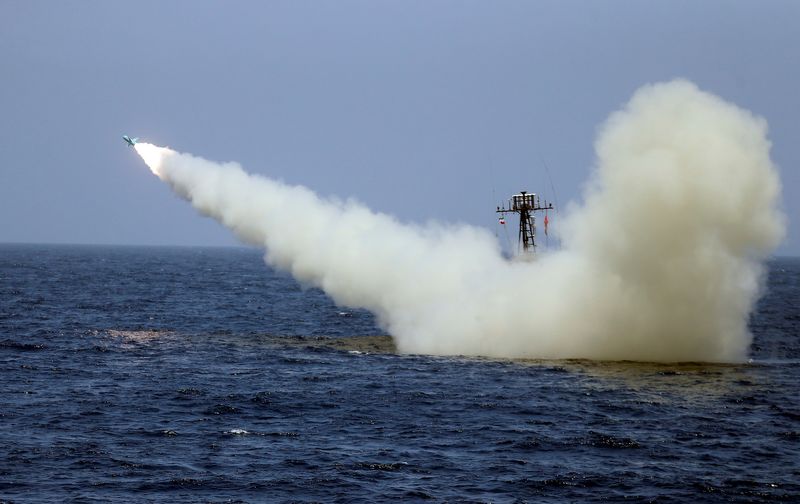DUBAI (Reuters) – Iran’s elite Revolutionary Guards launched a military drill in the Gulf on Tuesday, Iranian state television reported, at a time of high tension between Tehran and Washington.
The U.S. military said the drill had caused two bases with American troops in the region to go on heightened alert and said Tehran’s missile launches were irresponsible.
There have been periodic confrontations in the Gulf in recent years between the Guards and the U.S. military, which has accused the Guards’ navy of sending fast-attack boats to harass U.S. warships as they pass the Strait of Hormuz.
Tehran, which opposes the presence of U.S. and Western navies in the Gulf, holds annual naval war games in phases in the strategic waterway, the conduit for some 30% of all crude and other oil liquids traded by sea.
“The final stage of the drill called ‘Great Prophet 14’ with the participation of the Guards Navy and Air Force has started in the areas of land, air, sea and space in … the Strait of Hormuz and the Persian Gulf,” Iran’s state TV reported.
The Guards, in a statement quoted by the semi-official Fars news agency, said its naval and air forces would use “missile, UAV and radar units” in the drill.
In a statement, the U.S. military’s Central Command said Al Udeid Air Base in Qatar and Al Dhafra Air Base in the United Arab Emirates were put on a heightened alert status out of an abundance of caution because an initial assessment showed a potential threat.
“The incident lasted for a matter of minutes, and an all clear was declared after the threat indicator had passed,” the military statement said.
Satellite images published on Monday showed Iran has moved a mock-up U.S. aircraft carrier to the Strait, suggesting it will use the fake vessel for target practice in war games there.
Commander Rebecca Rebarich, spokeswoman for the U.S. Navy’s Bahrain-based Fifth Fleet, said the U.S. military was “always watchful of this type of irresponsible and reckless behaviour by Iran in the vicinity of busy international waterways.”
But she said that “this exercise has not disrupted coalition operations in the area nor had any impacts to the free flow of commerce in the Strait of Hormuz and surrounding waters.”
Tensions have spiked between Iran and the United States since 2018, when U.S. President Donald Trump withdrew from Iran’s 2015 nuclear deal with six powers and reimposed sanctions that have sharply lowered Tehran’s oil exports.
The Guards in April said Tehran would destroy U.S. warships if Iran’s security is threatened in the Gulf. Iranian officials have repeatedly threatened to block Hormuz if Iran is not able to export oil or if its nuclear sites are attacked.
(Writing by Parisa Hafezi, additional reporting by Lisa Barrington in Dubai and Idrees Ali in Washington, Editing by Tom Brown)





















